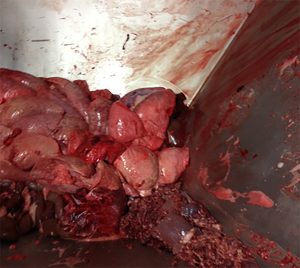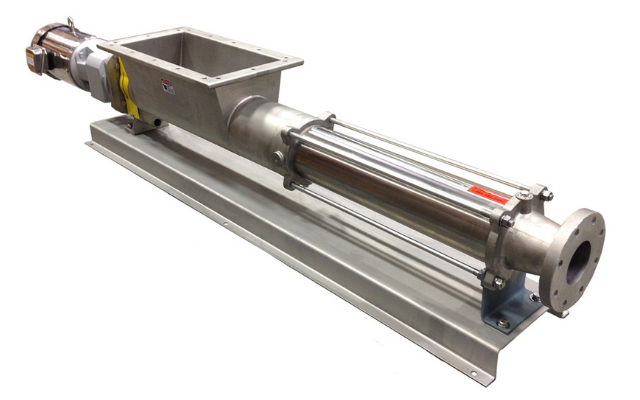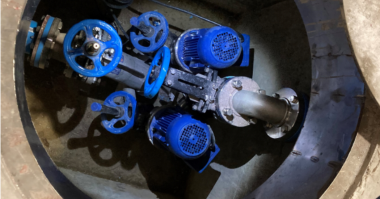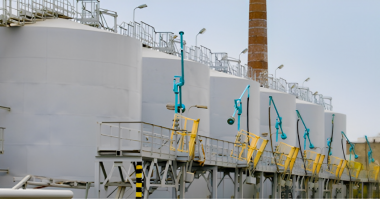By Antonio Castilhos
The meat preparation industry requires a wide range of equipment for processing, transporting and packaging on a mass scale. This industry has to comply with extremely high sanitary and hygienic standards and regulations.
Using Progressing Cavity Pumps In an Array of Meat Processing Applications
Viewed in technical terms, the mechanized meat processes encounter numerous variations even within a single meat product such as shape, density, size, texture, friction factors and presence of bones. Meat is susceptible to contamination by bacteria and spoilage due to temperature. Another major segmentation is based on usage: the meat for human consumption, by products used in other industries, and waste product requiring appropriate disposal.

NEMO® stainless steel pumps are designed to create cavities that transport the product smoothly from the suction side to the discharge side.
NETZSCH NEMO® Progressing Cavity Pumps are routinely used for pumping meat products, with or without bones. This pump type primarily consists of a single helix metallic rotor turning inside a double helix elastomeric stator. The rotating and stationary parts are designed to create cavities that transport the product smoothly from the suction side to the discharge side. The low shear characteristics of this pump type preserves the product integrity, and does not alter its physical attributes.
These pumps are easy to maintain, and have additional features to enable ease of assembly and disassembly to facilitate Clean-In-Place and Full Service-In-Place requirements dictated by the Standards for meat products. Following are two application examples: one in Chapeco, Brazil and one in Eastern Pennsylvania in the US.
A NETZSCH Pump at a Processing and Packaging Plant in Brazil
BRF is a global company based in Brazil with locations on six continents. A turkey slaughterhouse is located in Chapeco, Santa Catarina and the slaughtered turkeys are brought to the BRF processing and packaging plant. The cleaned turkeys are first cut into four different sections. Some parts have bone and others do not. The size of these pieces vary.
The large chunks of meat, approximately 9 inches by 5 inches in size, are fed into an MSM (Mechanically Separated Meat) machine that reduces the meat to much smaller pieces that are roughly 1.5 inches by 3 inches in size. These pieces are pumped through a NEMO® progressing cavity pump that includes an open hopper and auger arrangement to push them into the suction casing of the pump.
In a subsequent operation, another MSM reduces these smaller meat pieces into ground meat. A NEMO® pump is used at this point to push the ground meat in a continuous compressed stream for the packaging process.
More than fifty (50) NETZSCH pumps installed since 2014, are operating trouble free in several locations in Brazil for this application.
While poultry and turkey products are processed mainly at ambient or moderate temperatures, processing pork products, for example, is significantly different. It is customary practice to process pork products at colder temperatures – slightly below freezing.
To retain the quality of the meat, pig carcasses are rapidly chilled for 24 to 48 hours before they are cut into smaller pieces. The very cold operating conditions, and a wide range of temperatures between pumping the product and flushing the pumps at high temperatures for cleaning imposes special challenges when selecting materials for pumps.
NETZSCH Progressing Cavity Pump For Temperature Variation in Pennsylvania
 In a meat processing plant in Eastern Pennsylvania, a company was pumping internal pig organs to a Protein Processing System. The organs were of varying size and there was some fluid in the form of blood present to provide lubricity. However, the real challenge was that the product was pumped cold at 40 degrees F (4° C), but during the Clean-In-Place process the cleaning fluid circulated through the pump was hot, at 150 degrees F (65.5° C).
In a meat processing plant in Eastern Pennsylvania, a company was pumping internal pig organs to a Protein Processing System. The organs were of varying size and there was some fluid in the form of blood present to provide lubricity. However, the real challenge was that the product was pumped cold at 40 degrees F (4° C), but during the Clean-In-Place process the cleaning fluid circulated through the pump was hot, at 150 degrees F (65.5° C).
Initially, this customer was using a progressing cavity pump manufactured by a competitor but their stators were failing in a very short time due to the significant difference in temperature between operating conditions and Clean-In-Place conditions. The Mean Time Between Failure (MTBF) was unreasonably short and required very expensive spare parts.
NETZSCH engineers suggested a more suitable elastomer with properties that could handle the temperature variation for the stator thereby creating a much longer MTBF. The NETZSCH pump has been operating in this application since 2012. The customer is satisfied with the service life of the stator.
Pumps that Meet Strict Government Standards
NETZSCH uses FDA compliant materials for the construction of pumps used in the Food industry. In other countries similar Regulatory Agency rules may apply. In addition to the materials, the design of the pumps used for food applications also has to comply with specifications to prevent the product from lodging in areas where bacteria may form.

Pig livers in the hopper of a NEMO stainless steel pump as they proceed to a Protein Processing System.
The metallic parts of the NEMO® food grade pumps are primarily Stainless Steel 304 or 316 with polished surfaces (432 Ra), but the real challenge requires a suitable elastomeric material for the stator. The NETZSCH engineering team has developed several superior FDA compliant elastomers with excellent mechanical and rheological properties. These elastomers are wear resistant and also efficient in handling solid pieces of meat with variable lubricity.
NETZSCH progressing cavity pumps used in both the processes discussed here handles the meat of different shape, size and consistency with equal ease and provides the desired result. BRF and similar meat processing and packaging companies are using NETZSCH pumps for its reliability, efficiency and low maintenance.





Comments